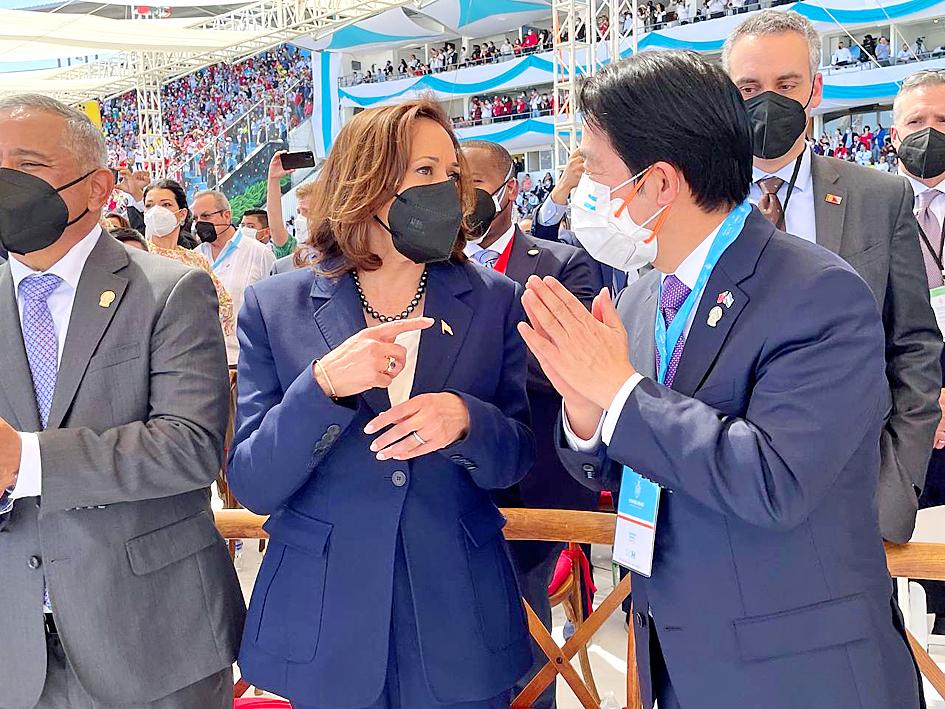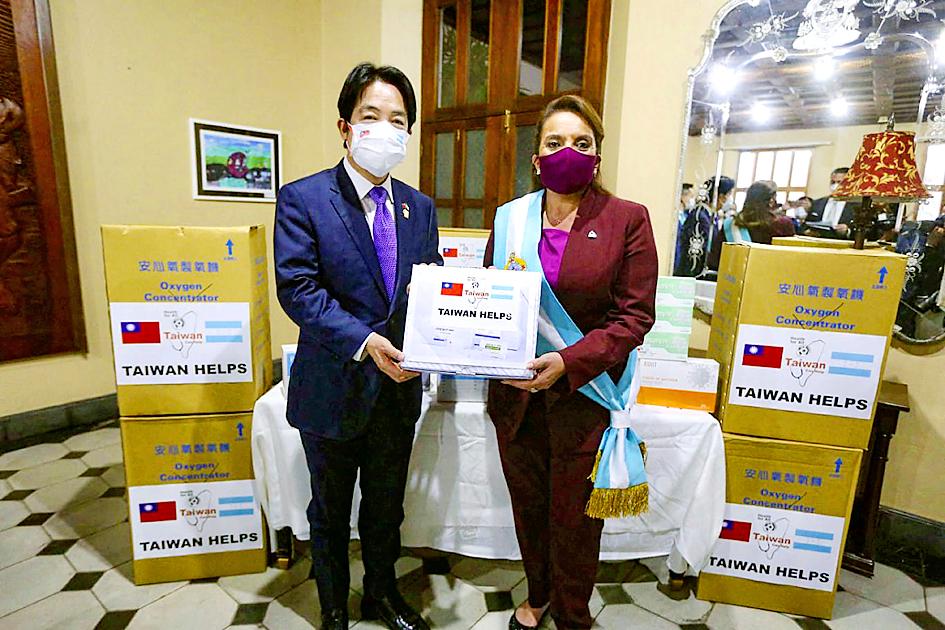Vice President William Lai (賴清德) on Thursday spoke briefly with US Vice President Kamala Harris in their first public meeting, at the inauguration of Honduran President Xiomara Castro.
As the last government envoy introduced at the packed sports stadium where the ceremony was held, Harris greeted the international leaders present, including Lai, who was sitting in the front row near Costa Rican President Carlos Alvarado Quesada and King Felipe VI of Spain.
Lai and Harris spoke briefly, the first time the vice presidents have interacted at a public event since taking office in 2020 and last year respectively.

Photo: CNA
Commenting on their impromptu conversation, which the international media characterized as “highly symbolic,” Harris told reporters after the inauguration that she and Lai talked about “a common interest in this part of the region.”
Their conversation also touched on “Taiwan’s interest in our root causes strategy,” Harris said, referring to the US’ efforts to curb migration.
Reuters described the encounter as “likely to add to Beijing’s tensions with Washington.”

Photo: AFP / Honduran presidency
Speaking at a news conference with Taiwanese reporters, Lai declined to reveal what he and Harris discussed, saying only that he thanked the US vice president for her country’s support of Taiwan.
Lai also posted a photograph on Facebook of him among a group of people including King Felipe.
Lai is leading a delegation to Honduras to attend Castro’s inauguration and meet with officials from its new government.
He was yesterday to return home via San Francisco.
The Presidential Office said that Lai invited Castro to visit Taiwan during a bilateral meeting held after she was sworn in.
During the meeting, Lai extended the invitation to Castro on behalf of President Tsai Ing-wen (蔡英文), and expressed Taiwan’s continued support for the Honduran government as it pushes for economic reform and fights against corruption, the office said.
As Tsai and Castro are the first female presidents of their respective countries, their meeting would be a testament to global efforts to promote women’s empowerment, the office quoted Lai as saying.
Lai also proposed that Taiwan, Honduras and the US collaborate on “helping Honduras solve various problems,” the office said, without providing specifics.
Additional reporting by Reuters

MISINFORMATION: The generated content tends to adopt China’s official stance, such as ‘Taiwan is currently governed by the Chinese central government,’ the NSB said Five China-developed artificial intelligence (AI) language models exhibit cybersecurity risks and content biases, an inspection conducted by the National Security Bureau (NSB) showed. The five AI tools are: DeepSeek, Doubao (豆包), Yiyan (文心一言), Tongyi (通義千問) and Yuanbao (騰訊元寶), the bureau said, advising people to remain vigilant to protect personal data privacy and corporate business secrets. The NSB said it, in accordance with the National Intelligence Services Act (國家情報工作法), has reviewed international cybersecurity reports and intelligence, and coordinated with the Ministry of Justice Investigation Bureau and the National Police Agency’s Criminal Investigation Bureau to conduct an inspection of China-made AI language

BOOST IN CONFIDENCE: The sale sends a clear message of support for Taiwan and dispels rumors that US President Donald Trump ‘sold out’ the nation, an expert said The US government on Thursday announced a possible sale to Taiwan of fighter jet parts, which was estimated to cost about US$330 million, in a move that an expert said “sends a clear message of support for Taiwan” amid fears that Washington might be wavering in its attitude toward Taipei. It was the first announcement of an arms sale to Taiwan since US President Donald Trump returned to the White House earlier this year. The proposed package includes non-standard components, spare and repair parts, consumables and accessories, as well repair and return support for the F-16, C-130 and Indigenous Defense Fighter aircraft,

CHECKING BOUNDARIES: China wants to disrupt solidarity among democracies and test their red lines, but it is instead pushing nations to become more united, an expert said The US Department of State on Friday expressed deep concern over a Chinese public security agency’s investigation into Legislator Puma Shen (沈伯洋) for “secession.” “China’s actions threaten free speech and erode norms that have underpinned the cross-strait ‘status quo’ for decades,” a US Department of State spokesperson said. The Chongqing Municipal Public Security Bureau late last month listed Shen as “wanted” and launched an investigation into alleged “secession-related” criminal activities, including his founding of the Kuma Academy, a civil defense organization that prepares people for an invasion by China. The spokesperson said that the US was “deeply concerned” about the bureau investigating Shen

‘TROUBLEMAKER’: Most countries believe that it is China — rather than Taiwan — that is undermining regional peace and stability with its coercive tactics, the president said China should restrain itself and refrain from being a troublemaker that sabotages peace and stability in the Indo-Pacific region, President William Lai (賴清德) said yesterday. Lai made the remarks after China Coast Guard vessels sailed into disputed waters off the Senkaku Islands — known as the Diaoyutai Islands (釣魚台) in Taiwan — following a remark Japanese Prime Minister Sanae Takaichi made regarding Taiwan. Takaichi during a parliamentary session on Nov. 7 said that a “Taiwan contingency” involving a Chinese naval blockade could qualify as a “survival-threatening situation” for Japan, and trigger Tokyo’s deployment of its military for defense. Asked about the escalating tensions